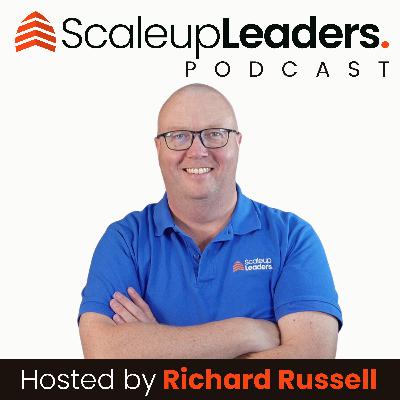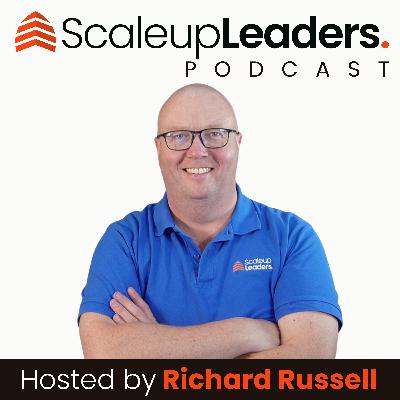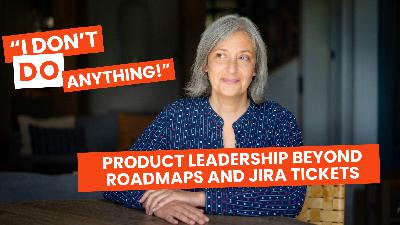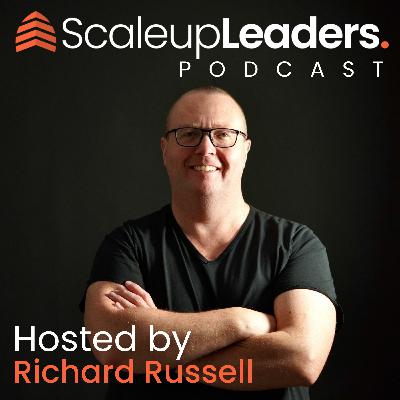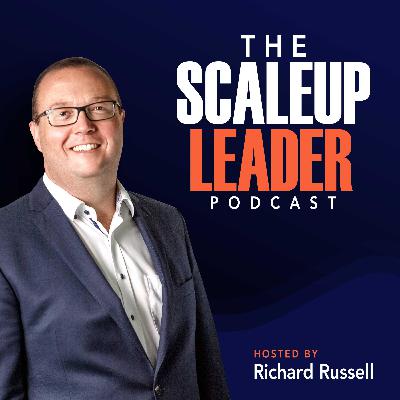Discover Scaleup Leaders: Stories from Experience
Scaleup Leaders: Stories from Experience

Scaleup Leaders: Stories from Experience
Author: Richard Russell
Subscribed: 1Played: 2Subscribe
Share
© Richard Russell
Description
Interviews with successful leaders of scaleups and big techs about the challenges they faced while scaling themselves and their businesses.
The host, Richard Russell, has worked at Google and Amazon in product, technology and business leadership roles. He now works as an executive coach helping functional experts transform into strategic leaders in roles like CEO, CPO and CTO in scaleup environments.
Learn more about Richard at www.richardrussell.co
scaleupleaders.substack.com
The host, Richard Russell, has worked at Google and Amazon in product, technology and business leadership roles. He now works as an executive coach helping functional experts transform into strategic leaders in roles like CEO, CPO and CTO in scaleup environments.
Learn more about Richard at www.richardrussell.co
scaleupleaders.substack.com
32 Episodes
Reverse
This week, I’m joined by Egil Østhus — co-founder and CEO of Unleash, an open-source feature management platform used by teams at Wayfair, T-Mobile, Allianz, and more.Before launching Unleash, Egil led engineering at Visma, a 6,000+ developer SaaS giant. He’s seen both the slow grind of corporate transformation and the chaos of building from scratch — and in this conversation, we talk about what he’s learned from both.We get into:* Why leadership isn’t so different between big companies and startups* How they built a no-ego, high-trust culture at Unleash* Why being too frugal nearly slowed them down* Egil’s coaching-style approach to leading teams* How he handles remote work, loneliness, and vulnerability as a founderThere’s a moment in this interview — where Egil shares how he felt completely exposed in front of his team — that really stayed with me. If you’ve ever felt the weight of leadership, you’ll hear yourself in this episode.Let me know what resonates with you — or forward it to someone building something brave.🎧 Timestamps:* 0:00 Intro* 2:10 Why feature management matters* 7:40 What changes (and what doesn’t) when you go from corporate to startup* 12:00 Building culture from day one* 16:10 Leading with coaching, not command* 23:00 Vulnerability, trust, and showing up* 28:00 Remote work, loneliness, and presence* 33:00 What Egil’s still figuring out📌 Subscribe for more interviews with scaleup leaders.🔗 Learn more about Unleash: https://www.getunleash.io/📣 Follow Egil: https://www.linkedin.com/in/egilosthus/ This is a public episode. If you would like to discuss this with other subscribers or get access to bonus episodes, visit scaleupleaders.substack.com
What do you do when you’re suddenly in charge… and totally unprepared?In this episode, I speak with Gillian Davis, leadership strategist and founder of Overtime Leader, who’s spent the last decade helping scaleups grow their leadership and culture as they move from scrappy startup to mature company.Gillian’s journey started with crisis: she took over her family’s business when her father fell ill. She later left corporate “with a vengeance,” and found herself dropped into a high-growth tech company with zero systems, zero onboarding, and a ton to figure out.Since then, she’s served as VP of People at WeTransfer, co-authored the book First-Time Leader with George Bradt, and worked with leadership teams to help them scale intentionally — before chaos sets in.In this conversation, we talk about:* The intern confrontation that reshaped her leadership style* Why she quit corporate without a plan — and what she found instead* How product thinking changed how she does organisational design* Common mistakes founders make when hiring senior leaders* Why fast growth doesn’t mean rushing leadershipWhether you’re a founder, a first-time VP, or just someone trying to lead through uncertainty — this one’s packed with stories and insights you’ll want to remember.🔗 Guest Links* Gillian’s website: OvertimeLeader.com* Gillian on LinkedIn: linkedin.com/in/davisgillian* Her book: First-Time Leader (with George Bradt)🗂️ Timestamps* 00:00 – Intro & Gillian’s origin story* 05:30 – Leading through crisis with no playbook* 15:00 – The intern confrontation that changed everything* 22:00 – Leaving corporate with no plan* 26:00 – Joining a tech startup with no systems* 32:00 – Product thinking meets leadership* 45:00 – Helping founders build leadership post-Series A* 59:00 – The importance of brave, long-term leadership This is a public episode. If you would like to discuss this with other subscribers or get access to bonus episodes, visit scaleupleaders.substack.com
What happens when you go from designing or building things yourself… to leading a team of 100+? And what if your career didn’t follow the standard product ladder to get there?In this candid and funny conversation, Lidia Oshlyansky shares her journey from social worker to backend engineer to product and UX leader at companies like Google, Spotify, and fast-moving startups.We explore the invisible work of leadership, the emotional challenges of management, and what it really takes to drive change in complex organisations—without losing your humanity.Whether you’re navigating scale, burnout, tough cross-functional relationships, or wondering if you’re still contributing anything at all… this episode will resonate.🧠 In this episode, we cover:* Why Lidia left social work to become a backend engineer—and how she discovered product along the way* The existential doubt of managing managers (“What am I even doing?”)* A mindset shift: empowering others is the work* How to build better relationships between product, design, and engineering* What to do when collaboration breaks down—and why sometimes, the right move is to stop trying* How to approach transformation in legacy organisations without arrogance* The difference between startup chaos and corporate resistance—and how to lead through both💬 Favourite moment:“I like that creative innovation chaos—and I like being able to harness it.”👤 About Lidia:Lidia Oshlyansky is a veteran product, UX, and design leader with global experience across big tech (Google, Spotify), publishing, and startups. She’s currently Chief Product Officerat Gillion, a Stockholm-based fintech. You can find her on LinkedIn (her only public presence—by design!).🎯 For:* Product leaders navigating growth or career transitions* Managers stepping into more abstract leadership roles* Anyone wrestling with cross-functional dynamics, change, or self-doubt This is a public episode. If you would like to discuss this with other subscribers or get access to bonus episodes, visit scaleupleaders.substack.com
We often think great leadership is about having all the answers and staying composed under pressure. But what if the real key to leading a high-performing team is being open about your mistakes?In this episode, Kim Wylie reflects on two decades of leadership experience at Google, Farfetch, and scale-ups—sharing what actually builds trust and performance when you’re stepping into a new team.We talk about:• Why trying to be the perfect manager backfires• How Kim built psychological safety in a team that didn’t trust her at first• How to handle resistance to new ways of working in distributed teams• The team rituals she uses to foster connection, even across regions• What to do when your team gives you negative feedback• The neuroscience of why solving everyone’s problems is not good leadership• And how even senior leaders still struggle with imposter syndromeThis is a masterclass in human-centred leadership—with practical tools, real stories, and the kind of honest reflection most leaders wish they heard more often.🧠 Some Takeaways“If you’re a manager and you’re always solving everyone’s problems, you’re robbing them of that dopamine hit.”“One of the biggest lessons I learned is that being vulnerable builds trust—and trust drives performance.”“People need to see that how you show up on day one is how you’re going to keep showing up.”🔗 Links & ResourcesFollow Kim on LinkedInWatch the full video interview on YouTubeSubscribe to the podcast for more real stories and practical leadership insights.Connect to me and ask me about coaching! This is a public episode. If you would like to discuss this with other subscribers or get access to bonus episodes, visit scaleupleaders.substack.com
From Google to high-growth scaleups to the boardroom, Maya Moufarek has spent 20+ years helping founders scale their businesses. As the founding CMO of Pharmacy2U, she helped grow the UK’s largest online pharmacy to a scale equivalent to opening a new pharmacy every 2.5 days. Today, she’s a fractional CMO, board member, and angel investor, helping startups build scalable, profitable growth engines.In this episode, Maya shares: • 🚀 Scaling from startup to industry leader: How Pharmacy2U grew and the challenges they faced • 🤝 Cross-functional leadership: Why aligning senior teams (“first teams”) is critical in scaleups • 🔥 Lessons from Google & AMEX: What big tech taught her about stakeholder management • ⏳ Surviving near-failure: What she did when the company was running out of cash • 🏦 Navigating board & investor relations: How to handle tough conversations at the top • 🌍 Building a portfolio career: How Maya balances operator, investor, and board rolesWhere to Find Maya:🌍 Website: MarketingCube.co🔗 LinkedIn: Maya Moufarek This is a public episode. If you would like to discuss this with other subscribers or get access to bonus episodes, visit scaleupleaders.substack.com
Being a scaleup leader can feel like herding cats.- You’re growing, that’s great.- But your growth brings problems.- You have more people but they get less done.- Autonomy used to work, now there is misalignment.- People get in each other’s way and slow things down.Is the solution less autonomy? Or is that too restrictive?Cliff Hazell has the answer.Cliff worked with Spotify to grow from 700 to 5000 people. So he knows a thing or two about scaleups.✅ Have better meetings✅ Focus on a #1 priority✅ Introduce Flight Levels.Flight Levels operationalise strategy - they get people out of each other’s way to get more done.And if this is a new concept for you, then you’ll want to watch this episode where Cliff and I go deep into this whole topic.👉 How to find the sweet spot between autonomy and alignment.👉 Why an outsider is better at unblocking bottlenecks than you.👉 Why most meetings are unfortunately cr*p.👉 How Flight Levels solve all this?And if you'd like to connect with Cliff, you can find him on LinkedIn or at cliffhazell.com-------If you haven't already joined my weekly newsletter for tips and strategies in your inbox, you can join here.Connect with me in LinkedIn. Check out my YouTube channel. This is a public episode. If you would like to discuss this with other subscribers or get access to bonus episodes, visit scaleupleaders.substack.com
Christian Meinerding is the Co-Founder and CEO of HiveMQ, a company he founded 11 years ago. He told me about his experience growing a business from scratch, raising a €40 million series A for a total of €50 million raised and growing the team to almost 200 people.When Christian started out, his process of using OKRs was simple and straightforward. However, as his company grew, they started to notice ever increasing problems, and as a result had to make some pretty critical shifts in their OKR thinking.-------You can find Christian here: https://www.linkedin.com/in/goetzchr/Or on his website: https://www.hivemq.com/Follow me on LinkedIn: Richard Russell | LinkedInWant insider access to expert tips and strategies like this every week right in your inbox? https://richardrussell.co/#subscribe This is a public episode. If you would like to discuss this with other subscribers or get access to bonus episodes, visit scaleupleaders.substack.com
This week I'm joined by Marc Sniukas. Marc is a strategy advisor and he helps CEOs and leadership teams design and execute better strategy.We discuss why strategy can become a big complex monster and how to prevent that. And Marc reveals the three simple steps of strategy - understanding the context, making decisions, and taking action - and how you can use these to steps to creat your own better strategy today.-------------Are you subscribed to my YouTube channel yet? https://www.youtube.com/@richardarussellWant insider access to expert tips and strategies like this every week right in your inbox? https://richardrussell.co/#subscribe This is a public episode. If you would like to discuss this with other subscribers or get access to bonus episodes, visit scaleupleaders.substack.com
Team meetings feeling lacklustre and unproductive? Do they often turn into lengthy sessions of updates that leave everyone feeling bored and frustrated?The problem is most likely that you're using a people-driven approach in your meetings. They typically mean: Roundtable updates People bored and not engaged No focus on plans and problem solving.In this episode, I explain how you can use an Agenda-Driven approach to transform your meetings so they're more productive and collaborative.----------------------------------Want insider access to expert tips and strategies like this every week right in your inbox? https://richardrussell.co/#subscribeAre we connected on LinkedIn yet? This is a public episode. If you would like to discuss this with other subscribers or get access to bonus episodes, visit scaleupleaders.substack.com
Zoltan Vardy is a startup mentor who helps B2B tech founders struggling with sales to sell and market to enterprise clients. We had a great discussion about: Not adapting for every client to actually help them make a choice. Choosing your battles Goal setting for sales when you don't have any idea what a realistic number would be Shiny object syndrome...and a few more things besides.If you enjoyed this episode, you can subscribe to my newsletter at https://richardrussell.co/#subscribe and follow me on LinkedIn.If you'd like to connect with Zoltan, you can find him here on LinkedIn, and at zoltanvardy.com/podcast where you can download his free video guide. This is a public episode. If you would like to discuss this with other subscribers or get access to bonus episodes, visit scaleupleaders.substack.com
Many of my clients have had a bad experience of OKRs before working with me. And I noticed that the reasons they had been failing were the same.So I dug out all my past client notes, went through them meticulously gathering the most common mistakes, and finally complied this hit list of the Top 10 Tips to make sure you implement your OKRs right.Want insider access to expert tips and strategies like this every week right in your inbox? Subscribe to my weekly newsletter: https://richardrussell.co/#subscribe This is a public episode. If you would like to discuss this with other subscribers or get access to bonus episodes, visit scaleupleaders.substack.com
What remote working teams lack is remote collaboration - a place where people informally put forward ideas, get input, rework them, agree, disagree and come to an agreement!To create this, we need a fresh approach - something other than Zoom meetings. Online meetings are formal and agenda driven - they don’t lend themselves to the informality of problem solving discussions. And that's where the Strawman Document comes into play. So join me this week as we explore exactly what the Strawman Document is, and discover how you can use it to elevate your remote team's productivity and cohesion.If you enjoyed this episode, subscribe to my newsletter to get more tips and strategies every week - www.richardrussell.co/subscribe This is a public episode. If you would like to discuss this with other subscribers or get access to bonus episodes, visit scaleupleaders.substack.com
Unless you plan HOW you’re going to execute on your OKRs after you’ve set them, you probably won’t achieve them.But this is where I see a lot of my clients stumbling and making one of these mistakes: They set OKRs and think they’re done. Setting and forgetting is like buying that online course, watching all the videos… …and doing nothing. 2. They write a monster 20-page plan. You want feedback and input for others. No one is going to critique something and give you good feedback if you have poured your heart and soul into the plan. It looks too finished.Here’s my solution:👉 𝐀 𝐬𝐢𝐦𝐩𝐥𝐞 𝟏-𝐩𝐚𝐠𝐞 𝐩𝐥𝐚𝐧 𝐭𝐡𝐚𝐭 𝐠𝐞𝐧𝐞𝐫𝐚𝐭𝐞𝐬 𝐝𝐢𝐬𝐜𝐮𝐬𝐬𝐢𝐨𝐧. 👈 This is a public episode. If you would like to discuss this with other subscribers or get access to bonus episodes, visit scaleupleaders.substack.com
It seems logical. You've got company level OKRs and team OKRs, so it would make sense to have individual OKRs, right?Wrong. Because... They undermine the benefit of cross-functional alignment you get from company and team OKRs. Managers are tempted to use individual OKRs as a performance measurement tool. Too many OKRs means you don’t focus on what you need to do and the trade offs you need to make to win. Instead it will seem like you can do it all!So, what should you do instead? And is there no place for individual OKRs at all?Get answers to these and my deep dive into the pitfalls of individual OKRs in this week’s episode.Want insider access to expert tips and strategies like this every week right in your inbox? https://richardrussell.co/#subscribe This is a public episode. If you would like to discuss this with other subscribers or get access to bonus episodes, visit scaleupleaders.substack.com
Too often a business strategy consists only of 6 or 7 strategic pillars. So when it comes to writing OKRs, people have difficulty. Why? Because pillars don't tell you what to do next. They don't help you work out what the steps are to achieve your goals.To do this you need a strategy that has a narrative - a story. In this episode of Scaleup Leaders, I'll tell you exactly what this means, why it's important, and how to write your own strategy hero story.(During this episode I reference an image of strategic pillars. You can see the image here: https://drive.google.com/file/d/18BfeftsF59JShI2IzWnJCTC18mKKE55L/view?usp=share_link ) This is a public episode. If you would like to discuss this with other subscribers or get access to bonus episodes, visit scaleupleaders.substack.com
Nick Burne is on a mission to help nonprofits large and small grow their fundraising on social platforms with his company, GivePanel.Nick started GivePanel in 2019 with one employee. Fast forward to 2023 and he now employees 30 people across 5 countries.Join me as I chat to Nick about his incredible journey, and discover the Highs and Lows he has experienced building his business and being the CEO! This is a public episode. If you would like to discuss this with other subscribers or get access to bonus episodes, visit scaleupleaders.substack.com
Nikos Kryvossidis is the best manager I never had (he was my boss’s boss at Google, so not technically my manager)He had a knack for inspiring great loyalty among his team…protecting them from bureaucratic overloadAnd helping them be efficient and productive.In our conversation, we discuss✅ Is CTO a technical or a business role?✅ How does Nikos collaborate with other executives as a CTO? What works and what doesn’t?✅ How do you get started in a new CTO role?✅ What are Nikos’ views on OKRs…and much more. This is a public episode. If you would like to discuss this with other subscribers or get access to bonus episodes, visit scaleupleaders.substack.com
Join me and Michal Bohanes on this episode as we go back to basics with OKRs.We’ll be covering✅ exactly what OKRs are✅ why you should use them to track your goals✅ how they fit in with your company strategy and vision✅ and exactly how you can get started with implementing them.Finally, we’ll also look at what alternatives to OKRs exist for companies to use to keep themselves on target for their goals. This is a public episode. If you would like to discuss this with other subscribers or get access to bonus episodes, visit scaleupleaders.substack.com
Join me to learn what OKRs are, why use them, how to use them and how to get started. We'll go through the basics of OKRs and break some of the most common misconceptions that hold people back.At the end of this episode, I'll be offering some serious discounts to my Scaleup Leaders Operating System program, and give you a sneak preview of the four critical rhythms every leader must drive to deliver results and scale - the framework that the Scaleup Leaders Operating System is built upon.To get in touch:richard@russelland.companyrichardrussell.colinkedin.com/in/richardarussell This is a public episode. If you would like to discuss this with other subscribers or get access to bonus episodes, visit scaleupleaders.substack.com
Ever been in a situation where your team is in conflict with another team, perhaps over shared resources, and you can't resolve it?Here's how to make progress using a simple document and meeting format that will not only unblock the stalemate, but increase your management's confidence in empowering you to make these decisions in future.Stalemate Buster Template: https://docs.google.com/document/d/1VPELQYuUdTpPlC0ceFDAhMuYOwDGXbtivolfXkg9Aso/edit?usp=sharing This is a public episode. If you would like to discuss this with other subscribers or get access to bonus episodes, visit scaleupleaders.substack.com


